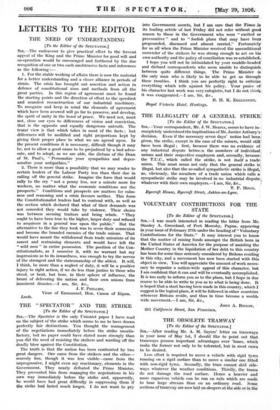LETTERS TO THE EDITOR
THE NEED OF UNDERSTANDING
[To the Editor of the SPECTATOR.] SIR,—The endeavour to give practical effect to the fervent appeal of the King and the Prime Minister for good will and co-operation would be encouraged and furthered by the due recognition of one or two such unobtrusive facts and inferences as the following :- 1. For the stable working of affairs there is now the material for a better understanding and a closer alliance in periods of strain. The crisis has brought out assertion and action in defence of constitutional aims and methods from all the great parties. In this region of agreement must be found the starting points and the direction of effort to the speediest and soundest reconstruction of our industrial machinery. To recognize and keep in mind the elements of agreement which have been avowed will go far to preserve, and develop, the spirit of unity in the bond of peace. We need not, must not, close our eyes to differences of vision and conviction, that is the opposite and equally dangerous untruth. The truest view is that which takes in most of the facts ; but differences will be mollified and right proportions kept by giving their proper place to what we are agreed upon. In the present conditions it is necessary, difficult though it may be, not to allow a good cause to be prejudiced by a bad advo- cate, and to adopt, as we are able, the dictum of the Dean of St. Paul's, " Personalize your sympathies and deper- sonalize your antipathies."
2. There is more than a possibility that we may render to certain leaders of the Labour Party less than their due in calling off the general strike. Imagine the force that would rally to the cry " not a penny less, nor a minute more for workers, no matter what the economic conditions nor the prospects." Conditions and prospects are matters for calm- ness and reasoning and a crisis favours neither. This force the Constitutionalist leaders had to contend with, as well as the section which declared that what of their demands was not conceded they would take by violence. Their choice was between seeming traitors and being rebels. " They ought to have been true to the higher, larger duty and refused to acquiesce in a general war upon the public." But the alternative to the line they took was to sever their connexion and become the branded enemies of the trade unions. That would have meant the withdrawal from trade unionism of its sanest and restraining elements and would have left the " wild men " in entire possession. The position of the Con- stitutionalists, as I conceive it, with no warrant but my impressions as to its inwardness, was enough to try the nerves of the strongest and the statesmanship of the ablest. It will, I think, be more than a neglect of duty, it will be a positive injury to right action, if we do less than justice to those who stood, or bent, but bore, in their sphere of influence, the brunt of delivering the nation and their own unions from imminent disaster.—I am, Sir, &c., J. F. Pmwps,
Vicar of Emmanuel, Hon. Canon of Ripon.
Leeds.










































 Previous page
Previous page